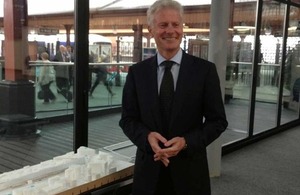HS2 Growth Taskforce comes to East Midlands to secure maximum boost for region's economy
HS2 Growth Taskforce meets key figures from across the East Midlands to maximise high speed rail benefits.

The HS2 Growth Taskforce is meeting key figures from across the East Midlands today (15 November 2013) as part of a series of visits designed to ensure regions maximise the economic benefits of high speed rail.
HS2 is set to play a key role in job creation, regeneration and development in the East Midlands. A new hub station at Toton (PDF, 372KB) would be very well connected with a fast and frequent rail shuttle service to Derby, Nottingham and Leicester. The journey time to London will be just 51 minutes from the East Midlands hub, while the stations in Leeds, Sheffield, East Midlands and Birmingham will each be less than 20 minutes apart, making daily commuting easy.
Combined with the current programme of rail electrification, this improved connectivity will help unlock the enormous potential and opportunities that Derby, Nottingham and the other cities and towns in the East Midlands have to offer – making them more attractive places to locate and do business.
Land around the East Midlands hub station will be a highly attractive investment proposition for developers and the Growth Taskforce will be looking at how to make the most of this opportunity. For example redevelopment of King’s Cross Station has seen public investment of £500 million attract £2.2 billion of private sector investment. As well as new businesses it could also mean hundreds of new houses in the region.
Commercial Secretary to the Treasury and Chair of the HS2 Growth Taskforce Lord Deighton said:
HS2 will give a massive boost to the East Midlands, creating new employment and business opportunities, freeing up capacity on the railways and improving connections to the West Midlands, north and south. But growth and regeneration will not just be handed on a plate and it is vital that the East Midlands does everything possible to harness the huge potential that the new north-south line offers.
The Growth Taskforce is determined to see the benefits of HS2 stretch far and wide, with an estimated 70% of jobs expected to be outside London. That is why getting out and meeting with city and business leaders is so vital. By planning ahead and thinking big, the East Midlands could start to benefit long before the first HS2 train arrives.
Chair of East Midlands Councils Cllr Jon Collins said:
HS2 has potential to boost our local economies through improving connectivity to London, Birmingham and the northern core cities, freeing up capacity on existing rail lines for more services, and creating jobs in our highly competitive transport engineering sector. However, we have to get it right. We are keen to work with Lord Deighton and others in government to ensure businesses and communities across the East Midlands can benefit from this investment.
The government believes HS2 will be a key driver of jobs and growth. The East Midlands region will benefit from up to 1,600 jobs as a result of station supported employment. This is in addition to opportunities from the 10,000 construction jobs being created across Phase Two of the route between Birmingham, Manchester and Leeds.
While research published recently by KPMG showed that HS2 could boost productivity in Derby, Nottingham and the surrounding region by up to £2.2 billion per year within five years of the railway opening. The government sees the Taskforce as crucial in unlocking this potential.
For places not immediately on the HS2 route, Network Rail’s report, Better Connections, shows how over 100 towns and cities on the existing network - such as Leicester and Loughborough - could benefit from quicker, more frequent journeys and faster connections. It explains that very little additional capacity can be squeezed from the existing railway. HS2 will provide Britain’s main rail arteries with new capacity, taking significant inter-city traffic off the existing network and allowing more local and regional services to run on these lines.
Membership of the Taskforce - an independent expert group comprising senior business, academia and local government representatives - was originally confirmed in July. Last month it published its initial report, HS2 Growth Taskforce: The Challenge. In it Lord Deighton says towns and cities across the country need to act now to become ‘HS2-ready’. The report sets out the key areas on which its final report will focus. It will provide recommendations to government early next year.
The regional visits will continue to the end of the year with further meetings set to take place across the country. Crucially they will also involve representatives from non station cities ensuring the Taskforce hears from as many people as possible.
While in the East Midlands, Lord Deighton will speak to engineering students at Loughborough University about the huge opportunities HS2 will bring, before meeting key business and political figures from the region at Loughborough Town Hall.
HS2 will:
- better connect 18 of Britain’s cities either directly or indirectly
- provide 351 miles of track linking London to Birmingham and Birmingham to Manchester and Leeds
- see Phase 1 open in 2026 and Phase 2 open in 2033
- see up to 18 trains per hour run in each direction with phase 2
- see trains will run at 225 miles per hour, with the potential to increase this to 250 miles per hour
Find out what else the government is doing to support and grow the UK economy
HS2 and major projects media enquiries
Media enquiries 0300 7777 878
Switchboard 0300 330 3000